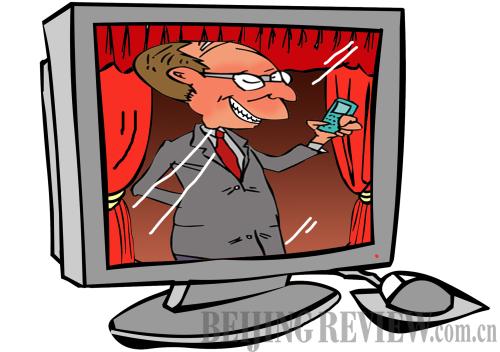|
 |
|
(LI SHIGONG) |
Nowadays, Twitter-like microblogging is no longer strange for government officials in China. China Youth Daily reported more than 1,300 officials have opened real-name microblogs on Sina microblog. And there are now more than 2,000 microblogs of government departments.
Compared with government microblogs responsible for issuing official announcements, the officials' personal electronic posts seem to be more interesting. How to open a microblog has already become a training course for high-level Beijing government officials.
Microblogs can bring government and the public closer together. They offer platforms for officials and ordinary people to communicate, and help in the settlement of problems. More importantly, as a trend, officials' microblogs may attract the attention of young people.
Officials' opening microblogs is happening in the headlines. One side speaks highly of the trend believing it is a social progress, while the other says it produces nothing but showboating.
Progress
Xiao Jiang (www.people.com.cn): I don't think officials are showing off in starting microblogs. They mean to do good things for the people. The opening of microblogs reflects the overall improvement of officials' personal quality, their enhanced awareness of the importance of the Internet, and better attention to public opinion.
Microblogs add to current ways of communication between officials and the public. As it's a private way of communication, it's more convenient for the public to allow their headaches to be known by officials.
Since microblogs have been opened, officials should make good use of them. For those who visit officials' microblogs must have thorny problems they hope officials may help to solve. Therefore, if officials do not take this platform seriously, then the public will be disappointed and the officials will lose the people's trust.
Wu Jinliang (www.xinhuanet.com): Microblogs provide a new way of communication between officials and the public. In the past, the relationships between officials and the public were stereotyped—officials said and the public listened; officials did and the public watched. But in the time of microblogs, this has changed. Today, officials have begun to think how to construct new and better relationships with the public through microblogs.
Jiang Huanqin (www.chinamining.com.cn): For common people, microblogging is a way to express whatever they think and want, as long as what he or she writes does not break laws or go against social morality. Officials' microblogs are different. In a certain sense, they represent the voice of government and are an important channel for officials to communicate with the public. For the officials with real-name microblogs, their microblogs are windows to the public to better know the government work.
Although microblogs are short, they are changing and affecting people's lives. This is one reason why greater numbers of officials have begun to pay attention to microblogs and blog themselves. We should applaud these officials. Starting microblogs shows these officials are willing to keep up with the times and trend.
At the same time, the public also has high expectations of officials' microblogs. It is reported Zhang Chunxian, Party Chief of the Xinjiang Uygur Autonomous Region, had attracted more than 3,200 fans three hours after he opened his microblog. If officials could use their microblogs well, microblogs could be a highlight in administrative reform.
Officials need to talk with the public sincerely in plain language, which will draw the public closer. The blogs could help in creating a better platform for directly exchanging views.
| 